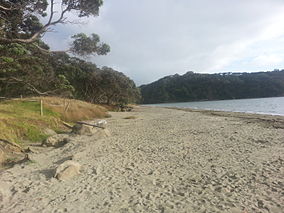Wenderholm Regional Park
| Wenderholm Regional Park | |
|---|---|
 Wenderholm beach to north | |
| Location | Rodney, Auckland, New Zealand |
| Nearest town | Waiwera |
| Coordinates | 36°32′13″S 174°42′36″E / 36.537°S 174.71°E[1] |
| Area | 135 hectares (330 acres)[2] |
| Established | 1965 |
Wenderholm Regional Park is a regional park north of Auckland in New Zealand's North Island. It is situated between the estuaries of the Puhoi River and the Waiwera River, on the east coast of New Zealand's North Island and features a homestead known as Couldrey House, and a carved pouwhenua.[3]
The park also features the 2 kilometres (1.2 mi) 'Maungatauhoro Te Hikoi' walking track, starting at the carved pouwhenua near the Couldrey House. The track features scenic views and birdlife.[4][5]
Wenderholm Regional Park was the first regional park established in the Auckland region, and is owned and managed by Auckland Council. Part of the park is sectioned off for ecological restoration.[6]
Geography
[edit]Wenderholm Regional Park is a peninsula between the Puhoi River to the north and the Waiwera River to the south. There are two major sections of the park: a sandspit at the mouth of the Puhoi River, and the Maungatauhoro headland, which is covered by bush.[2]
Biodiversity
[edit]
A 60 hectares (150 acres) section of the park has been set aside since 1965 for an ecological experiment, stopping livestock from grazing and repopulating the forests. This allowed native species of birds which were no longer in the area to be re-introduced in 1999. One of the first species released into the area, Petroica australis ssp. longipes (North Island robins), has a generally high rate of survival and procreated a good number of young, unfortunately not high enough to compensate for the loss of the adult population.[7] Tūī, kererū and New Zealand fantails are all commonly found in the park.[2]
Whales such as southern right whales may appear to rest and calve along the coasts. Dolphins may be visible from the shores as well.[6]
The native bush of the park prominently features pōhutukawa, with the blaze of red in the summer, on the slopes facing north is the kōwhai bush which are covered with yellow blooms in the spring, and the low-laying sandspit.[3][8] The Maungatauhoro headland forest includes tree species such as tawa, kohekohe, taraire, tōtara, nīkau palms, kahikatea and rimu.[2]
Australian kookaburras can occasionally be found in the regional park, having been introduced to Kawau Island in the 19th century.[2]
History
[edit]For approximately 1,000 years Māori lived in the area now encompassed by the park because it featured several natural resources. It was generally known as Te Awa Puhoi or 'The slow flowing river'.[9] Te Kawerau related tribes lives in the area, settling in locations such as Te Akeake, a kāinga at the mouth of the Puhoi Estuary and Kakaha Pā, a defensive outpost located at the highest point of the peninsula, Maungatauhoro / Wenderholm Hill.[10]
The Auckland politician and entrepreneur Sir Robert Graham protected many of the ancient trees in the area from felling to be used for timber for ships.[11] He went on to build a homestead in the park (now known as the Couldrey House), in the late 1850s.[10][2] Many of the historic trees in the park were given as gifts to Robert Graham from George Grey.[3] The name Wenderholm was the name given to Graham's residence.[10]
Graham planted many exotic species of plant at his home, and preserved a 19th-century grove of pōhutukawa trees in the 1880s.[10] Graham sold the land, and the homestead became known as the Couldrey House, named for its final owner, Herbert William Couldrey.[10]
In the 1960s, Herbert William Couldrey had attempted to subdivide the land at Wenderholm for lifestyle blocks. Despite being approved by the Rodney County Council the Auckland Regional Authority appealed the decision and acquired the land for £185,000 in 1965 under eminent domain. Wenderholm was opened as the first regional park of Auckland following this.[12][13]
Recreation
[edit]The Puhoi River is a popular spot for kayakers.[2]
References
[edit]- ^ "Wenderholm Map" (PDF). Auckland Council. Retrieved 15 May 2012.
- ^ a b c d e f g Janssen, Peter (January 2021). Greater Auckland Walks. New Holland Publishers. p. 31-32. ISBN 978-1-86966-516-6. Wikidata Q118136068.
- ^ a b c "Wenderholm". Auckland Council. Retrieved 1 September 2011.
- ^ Auckland Regional Park about Maungatauhoro
- ^ Maungatauhoro Te Hikoi at scoopnews
- ^ a b "Council profile". aucklandcouncil.govt.nz. Auckland Council.
- ^ Lovegrove, TG; Zeiler,CH; Green,BS; Green,BW; Gaastra,R and MacArthur,AD (2002). "Alien plant and animal control and aspects of ecological restoration in a small 'mainland island':Wenderholm Regional Park, New Zealand". Turning the Tide: The Eradication of Invasive Species: Proceedings of the International Conference on Eradication of Island Invasives: 155–163. ISBN 2-8317-0682-3.
{{cite journal}}: CS1 maint: multiple names: authors list (link) - ^ "Hauraki Gulf Review". Retrieved 27 September 2011.
- ^ Monk, Valerie (2004). A visitor's guide do Auckland regional parks. New Holland.
- ^ a b c d e Cameron, Ewen; Hayward, Bruce; Murdoch, Graeme (2008). A Field Guide to Auckland: Exploring the Region's Natural and Historical Heritage. Random House New Zealand. p. 121. ISBN 978-1-86962-1513.
- ^ Gregory, Angela (3 May 2008). "Moon shines in regional park". The New Zealand Herald. Retrieved 6 September 2011.
- ^ "Wenderholm Regional Park" (PDF). Auckland Council. Retrieved 25 July 2024.
- ^ "Beach Playground". Press. No. 30938. 20 December 1965.

